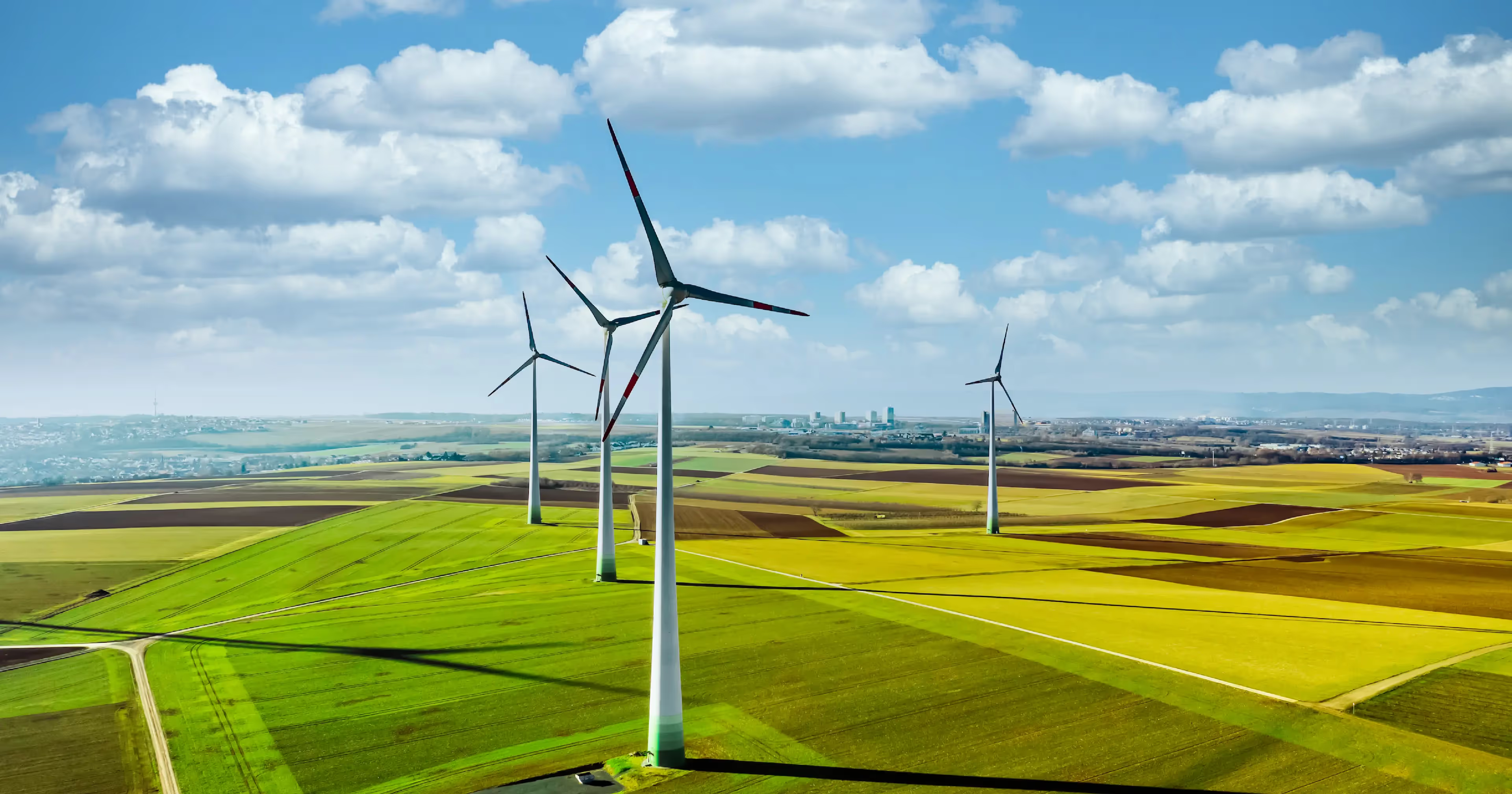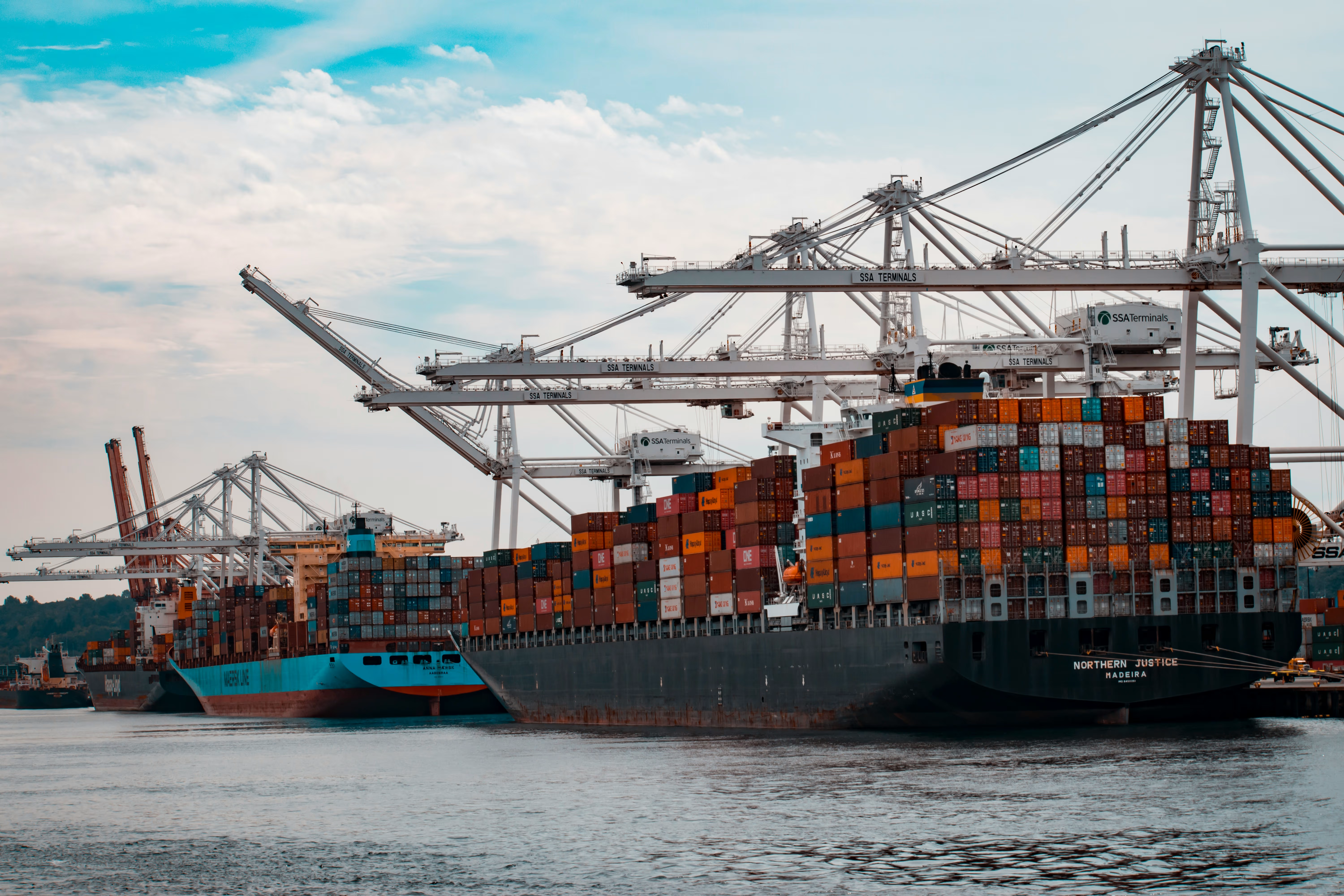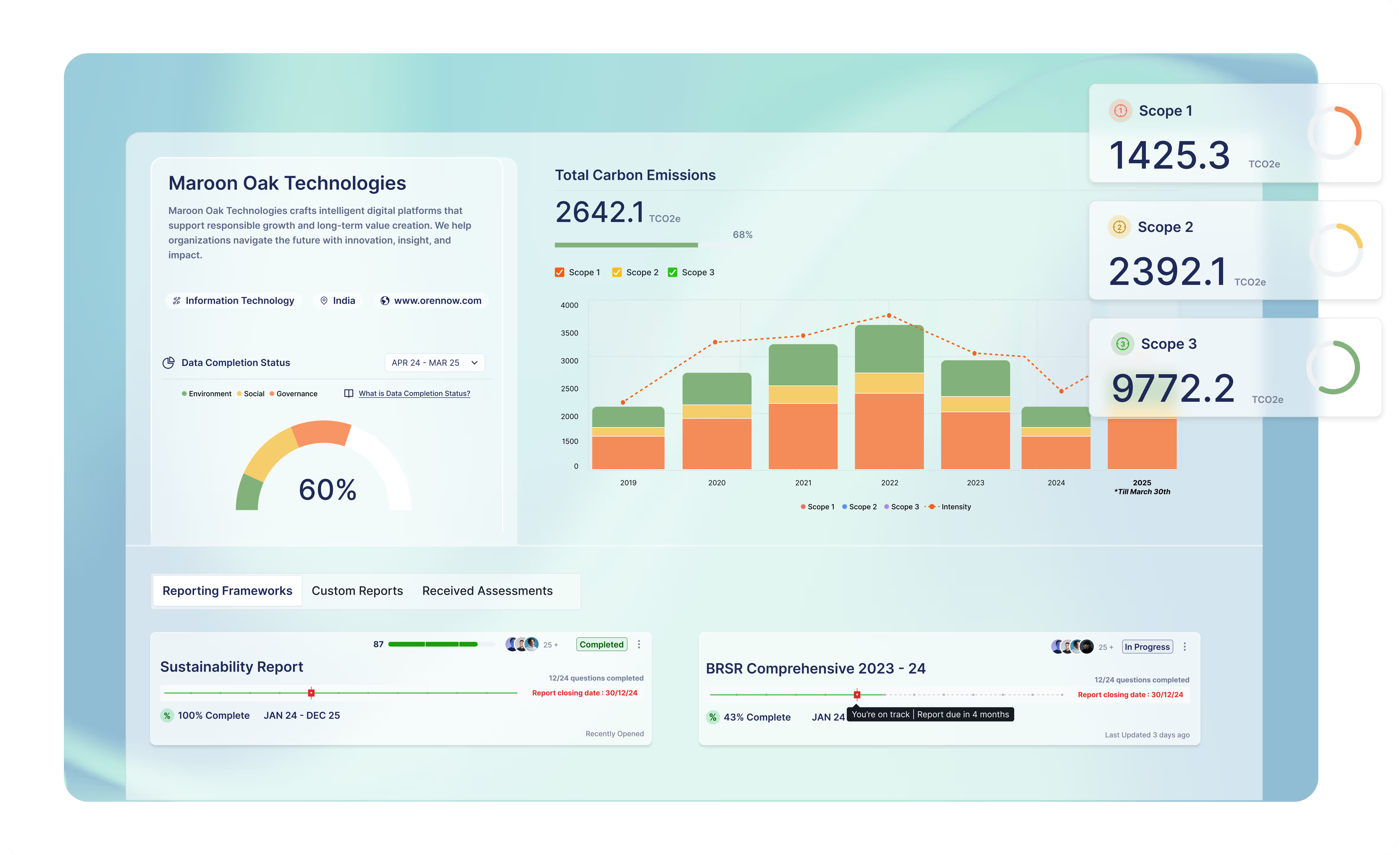Understanding Decarbonisation and Net-Zero: The Pathway to a Sustainable Future
-p-1080.avif)
In the evolving world of sustainability reporting in India and beyond, businesses and governments are increasingly committed to achieving net zero emissions. Net zero means balancing the amount of greenhouse gases (GHG) released into the atmosphere with an equivalent amount removed from it.
Achieving this requires efforts around decarbonization, i.e., reducing emissions by cutting reliance on fossil fuels or utilizing fossil fuels more efficiently and other measures. This can be achieved by switching from fossil fuels to renewable energy, adopting energy efficiency, managing resources more efficiently etc. This article explores the crucial steps toward achieving net zero, with a particular focus on decarbonization, which is the backbone of these efforts.
Why Decarbonization Matters Now?
Global warming is accelerating, and as per the 2024 Global Carbon Budget, limiting global warming to 1.5 degrees Celsius means only 235 gigatonnes of carbon dioxide can be released into the atmosphere. Our atmosphere today holds roughly 896 gigatons of carbon dioxide. At the current pace, that threshold could be crossed in less than six years. The result is an urgent need to adopt decarbonization and net zero for a sustainable future to save the planet, thus making immediate and decisive action critical.
1. Global Climate Goals
Aligning with this, the Paris Accord calls for a 45% cut in emissions by 2030 and to achieve net zero by 2050. Initiatives like the UN's Race to Zero campaign have mobilised businesses, cities, and other entities to begin acting immediately. For businesses, the challenge is to integrate these goals into their operations and strategies.
2. Business Risks and Opportunities
Decarbonization is not just about compliance with regulations; it's a long-term investment in the company's future. Companies that neglect this may face significant financial risks, as noted by a McKinsey report, which warns of potential losses of up to 20% of economic profit by 2030 for businesses that fail to decarbonise. On the flip side, embracing net zero decarbonization can unlock new opportunities, potentially adding $9 to $12 trillion in sales by 2030.
Global Frameworks and Targets for Decarbonization & Sustainability
Global frameworks like the Paris Agreement, Intergovernmental Panel on Climate Change (IPCC) targets, and UN Sustainable Development Goals (SDGs) contribute to coordinated climate action. The Paris Agreement establishes binding commitments to limit global warming, while the IPCC defines science-based emission reduction pathways. The SDGs broaden this vision, linking climate action to social and economic sustainability.
1. Paris Agreement
Adopted in 2015, it sets a binding framework to limit global warming to below 2 degrees Celsius with efforts to keep it to 1.5 degrees Celsius compared to pre-industrial levels. To meet this, the signatory countries must peak their country-level emissions before 2025 and reduce them by 43% by 2030 compared to the 2019 baseline levels. The Agreement drives accountability through Nationally Determined Contributions (NDCs) and regular Global Stocktakes. IPCC Targets
The Intergovernmental Panel on Climate Change (IPCC) provides scientific assessments on climate change, its impact, and possible mitigation pathways. While IPCC does not create policies and does not conduct its own research, its reports serve as a foundation for global agreements by highlighting risks of inaction. The IPCC reports are policy-relevant and neutral. This science-based information acts as clear benchmarks for countries and businesses by providing detailed and essential insights for net zero decarbonisation.
2. SDGs
Sustainable Development Goals (SDGs) or the Global Goals were adopted by the United Nations in 2015. These encompass a focus on a variety of aspects that impact the globe. There are a total of 17 SDGs, including those focusing on protecting the environment and planet. These are integrated goals where the impact on one field influences the impact on the other. The goals of relevance here are:
- SDG 7: Affordable and clean energy
- SDG 9: Industry, innovation and infrastructure
- SDG 11: Sustainable cities and communities
- SDG 12: Responsible consumption and production
- SDG 13: Climate action
- SDG 17: Partnership for the Goals
SDGs from the UN encourage sustainability and responsibility among businesses while creating new opportunities for growth and innovation. They provide a basis for companies pursuing decarbonization and net zero for a sustainable future.
Decarbonization: A Strategic Approach
Decarbonization is a shared responsibility that requires a proper approach. It is possible at multiple levels, i.e., individually, through businesses, government sectors, and even supply chains. Each level has a critical role in achieving net zero goals, and coordinated action amplifies impact.
Individual Strategies
Simple actions like reducing energy consumption, shifting to public transport, adopting plant-based diets, and supporting sustainable brands contribute to decarbonization. When aggregated, these lifestyle shifts create a measurable impact.
Corporate Strategies
1. ESG integration
Embed decarbonization into reporting and investment decisions to strengthen stakeholder trust
2. Renewable adoption
Transition to solar, wind, or other renewables to cut dependence on fossil fuels
3. Energy efficiency
Upgrade to energy-efficient equipment, adopt green building standards, and reduce wastage
4. Supply chain decarbonization
Collaborate with suppliers to track emissions, adopt low-carbon materials, and optimise logistics
5. Electrification
Electrifying legacy machinery that relies to completely eliminate the use of fossil fuels
6. Switching to lower carbon fuel
In activities where renewable adoption or electrification is not possible, corporates can look to switching from higher to lower carbon fossil fuels
7. Net-zero roadmaps
Set long-term emission reduction targets with milestones backed by transparent monitoring and disclosure
Government & Policy-led Strategies
1. Carbon pricing and trading
Governments can introduce carbon taxes and emission trading schemes to encourage emission cuts.
2. Green subsidies for green tech
Government by themselves or by partnering with financial institutions can provide financial support for clean technologies, electric mobility, and renewable energy mandates to corporates and individuals
3. Regulatory frameworks
Governments can also enforce emission caps, efficiency standards, and renewable energy mandates to align industries with climate goals
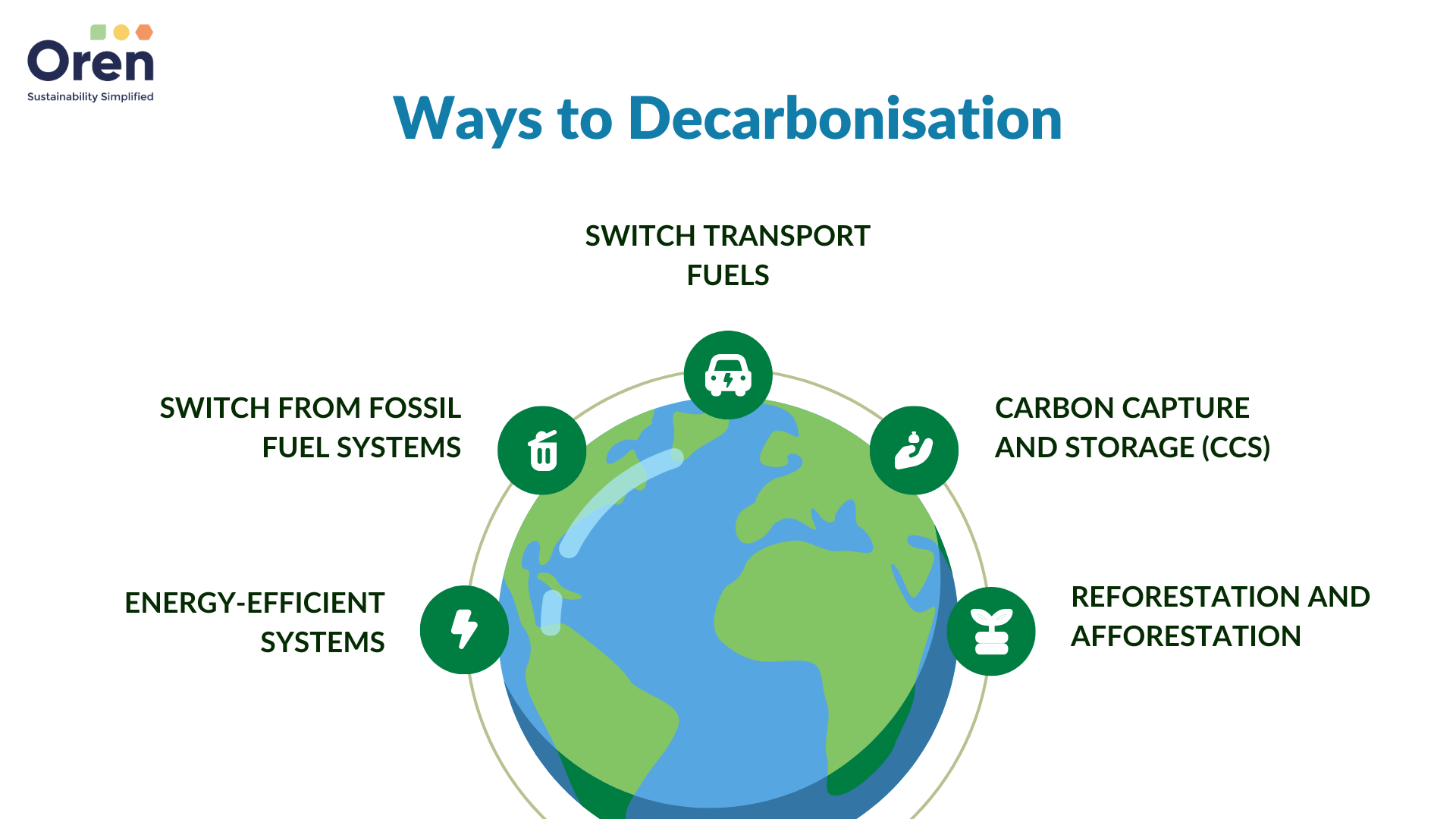
How Do We Decarbonise?
Certain methods companies can adopt to decarbonise are as follows:
1. Energy-efficient systems
Companies can replace older technologies with energy-efficient and low-carbon options to reduce emissions. For instance, heating, cooling, and ventilation systems help save energy.
2. Switch from fossil fuel systems
Rather than using fossil fuels, companies can choose to utilise energy obtained from renewable energy sources. It includes wind, solar, and hydroelectric power.
3. Switch transport fuels
Choosing Electric Vehicles (EVs) and prioritising public transport help reduce petrol and diesel consumption.
4. Carbon capture and storage (CCS)
Capturing carbon dioxide at emission sources and storing it for future use helps in decarbonization.
5. Reforestation and afforestation
Investing in the restoration of forests and plants contributes to natural absorption of carbon dioxide, thus offsetting human emissions.
Role of Supply Chains & Leadership
Achieving decarbonization requires strong supply chain transformation and committed leadership. Supply chains account for the majority of emissions while leaders set the tone for innovation, accountability, and value creation. Let us separately go through the contributions of both.
How does the supply chain contribute to decarbonization?
- Emission tracking and transparent reporting through lifecycle assessments and carbon accounting
- Adoption of innovative tools such as AI-driven analytics and automation
- Sustainable sourcing with low-carbon suppliers and circular procurement models
- Collaboration across partners to co-develop solutions and achieve decarbonization goals
- Digital monitoring platforms to measure Scope 3 emissions and ensure supplier accountability
How can leaders create value in the transition?
- Strengthening brand equity by aligning products and services with climate-conscious demand
- Building competitive advantage through sustainable innovation and differentiation
- Engaging stakeholders such as investors, employees, regulators, and customers in the transition
- Enhancing long-term resilience by reducing carbon dependency and preparing for regulatory shifts
Net-Zero Transition: Pathways & Energy System Transformation
Achieving net zero demands a deep transformation of the global energy system supported by structural changes in infrastructure and policy. Here are more insights into the same:
What Transition Involves?
A net zero transition requires a structural transformation of how energy is produced, distributed, and consumed. This includes replacing fossil fuel systems with renewable energy, upgrading infrastructure to be more efficient, and embedding low-carbon technologies across industries.
Beyond energy supply, it also involves behavioural shifts, innovation in financing, and coordinated policies that accelerate large-scale change. The transition possesses six characteristics:
- Universal change: Energy and land use systems everywhere must adapt, affecting every industry and country
- Significant investment: Annual spending on assets must rise sharply to reach trillions of dollars by mid-century
- Front-loaded effort: The heaviest investments and higher energy costs will appear in the early decades before stabilising
- Uneven impact: Industries like fossil fuels and regions dependent on them will face greater economic pressures
- Risk exposure: Phasing out high-emission assets too quickly could disrupt every supply and pricing
Where Are We Today?
The net zero transition at the global level is in its early stages. Numerous countries are committing to net zero emissions by 2050, with support growing from multiple other countries as well.
1. Global commitments
By June 2024, 107 countries, representing about 82% of the global greenhouse gas emissions, had announced or legislated net zero pledges. Alongside governments, over 9000 companies, over 1000 cities, more than 1000 educational institutions, and over 600 financial institutions have joined the UN’s Race to Zero campaign, committing to halve emissions by 2030.
2. Ensuring accountability
To make sure these commitments translate into action, the UN formed a High-Level Expert Group in 2022. It sets clear standards for net zero pledges, presenting recommendations at COP27.
3. Existing shortcomings
Despite this, current national climate plans remain inadequate, leading to only a 2.6% emissions reduction by 2030 instead of the required 43%. Energy production and consumption, responsible for over 85% of carbon dioxide emissions, highlight the urgent need for low-emission technologies and rapid systemic change.
Seven Domains of the Energy System & Requirements
The net zero transition must address seven interconnected domains of the energy system:
1. Power
Decarbonising power is fundamental to the transition, requiring massive electrification and large-scale integration of renewables.
2. Mobility
Transport systems must shift away from fossil fuels, with electrification and cleaner alternatives needed for road, air, and sea travel
3. Industry
Difficult-to-control sectors like steel, cement, plastics, and ammonia need deep innovation to reduce dependence on fossil fuels.
4. Buildings
Reducing emissions from heating buildings will demand efficient solutions such as heat pumps while also addressing performance in extreme climates.
5. Raw materials
Critical minerals like lithium and cobalt must be scaled up quickly to meet the rising demand for clean technologies.
6. Hydrogen and other energy carriers
Hydrogen and biofuels offer decarbonization pathways for sectors where electrification is limited but require new infrastructure and land resources.
7. Carbon and energy reduction
Cutting energy use and scaling carbon capture technologies will be vital to balance the unavoidable emissions.
Achieving Net Zero Through Decarbonization in Key Sectors
The method of net zero decarbonization adopted in different industries is as follows:
| Parameter | Global Reporting Initiative (GRI) | Sustainability Accounting Standards Board (SASB) |
|---|---|---|
| Definition | GRI offers globally applicable reporting standards. It deals with environmental, societal and governance issues. | SASB provides industry-specific standards to companies. It deals with financially material sustainability topics. |
| Functionality | Uses universal, sector and topic standards. The materiality principle guides them to identify the most significant ESG impacts. These are further used to choose relevant topics and report using the appropriate standards. | SASB offers 77 industry-specific standards with around six disclosure topics and 13 metrics. It also offers a visual guide, ‘Materiality Finder’, to help companies and investors apply the standards effectively. |
| How does it complement others | Acts as a comprehensive framework covering the complete ESG reporting process based on impact materiality. It can be used with SASB for balancing impact and finance-focused reporting. | Complements principle-based frameworks like IFRS S1 & S2 by focusing on the financial impacts of sustainability topics. Works with GRI standards, enabling companies to address both financial and broader societal impacts. Many businesses use a combination of SASB, GRI and IFRS S1 & S2 to meet diverse stakeholder needs. |
Example of Achieving Decarbonization Actions
The examples of net zero decarbonization actions in the real world are as follows:
1. Decarbonization in the city
Climate Action Program (CAP) from Santa Cruz that aims to reduce community-wide GHG emissions, is perfect to exemplify the decarbonization efforts. The program has set goals to achieve a 30% reduction by 2020 and an 80% reduction by 2050. The city has met its 2020 GHG emission goals and is expected to meet the set objectives of 2050 as well. The progress has been updated in the report of 2019, where they stated the following results:
- Successful retention of 200 certified Santa Cruz Green Businesses
- Usage of renewable energy to meet 30% for powering energy requirements of the city
- 65% waste diversion (less than the goal of 75% at the time of reporting)
2. Decarbonization in corporate properties
Canada has aimed to develop climate-resilient buildings along with other measures through the Canada Green Buildings Strategy. It has set a dedicated budget of $150 million for the task. The key steps in the strategy include:
- Upgrading federal buildings
- Promoting green building goals
- Supporting skills for developing energy-efficient and eco-friendly buildings.
Important Decarbonization Actions
The important actions that can contribute to net zero decarbonization endeavours are, as per the reports and papers, as follows:
- Transitioning industrial processes to electric alternatives
- Expanding renewable energy deployment
- Accelerating the adoption of zero and near-zero-emission vehicles
- Promoting fuel switching by replacing fossil fuels
- Reducing emissions from high global warming potential gases
- Strengthening and extending GHG and fuel economy standards
- Preserving and expanding natural carbon sinks
Challenges and Risks in Decarbonization Implementation
The challenges and risks in the implementation of net zero decarbonization are as follows:
1. Financial issues
Companies would require additional budget for incorporating low-carbon technologies, system upgrades, and training. The major impact is seen on small firms with limited budgets or uncertain returns on investment.
2. Technological constraints
Mature low-carbon technologies are limited in certain high-emission sectors. Heavy transport, process heat, and industrial material production depend on innovation and infrastructure development.
3. Behavioural challenge
Overconfidence by innovators, cultural and organisational resistance, fear of the unknown and new practice among employees, and lack of public acceptance of new energy use pose challenges in decarbonization.
4. Policy barrier
Updates in climate-based rules lead to a lack of clarity on enforcement methods and timelines for companies. It hinders long-term planning.
Turning Decarbonization Challenges Into Action
However, there do exist methods that companies can use to overcome these barriers through strategic action. Here are the insights into the solutions for achieving decarbonization and net zero for a sustainable future:
1. Innovation and technology adoption
Deploy low-carbon solutions, invest in emerging technologies, and enhance efficiency in operations
2. Partnerships and collaboration:
Work closely with suppliers, industry consortia, and other stakeholders to share best practices and align decarbonization efforts
3. Government policies:
Leverage subsidies, tax incentives, and regulatory guidance to facilitate technology adoption and investment
4. Data-driven insights:
Implement monitoring and reporting systems to track emissions, identify hotspots, and measure progress
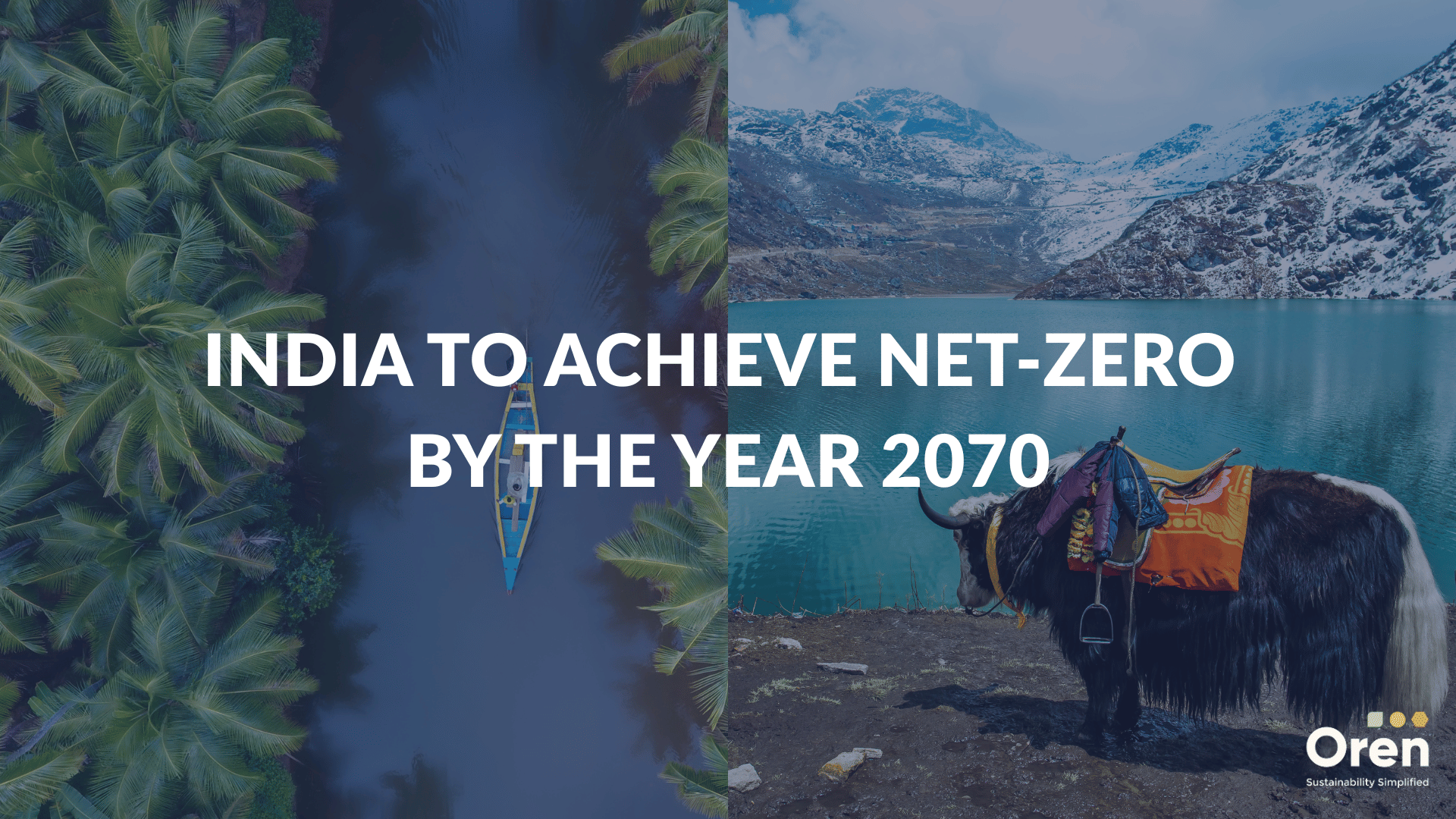
India’s Race Towards Net Zero
India has pledged to achieve net zero by 2070 with interim 2030 targets of 500 GW renewable capacity, a 45% cut in emissions intensity, and a 1 billion tonne emissions reduction.
1. Progress
It can be seen that renewables have crossed 200 GW, the Green Hydrogen Mission and nuclear expansion advancements, and Indian Railways is aiming for net zero by 2030. India also reported a 7.9% fall in emissions in 2020 compared to 2019.
2. Challenges
Solar and wind growth may fall short by 140 GW and 70 GW, respectively, by 2030, while coal remains dominant. The LT-LEDS lacks clear pathways, CCS planning and review policies, leaving policy gaps.
3. Opportunities
Digitalised supply chains, rapid green tech adoption, behavioural shifts in energy use, and international climate financing could accelerate India’s transition. With sharper strategies and stronger investments, India is setting the stage for decarbonization and net zero for a sustainable future. It can transform the opportunities into long-term climate leadership.
Conclusion
The pathway to achieving decarbonization and net zero for a sustainable future demands urgent action, backed by clear global frameworks like the Paris Agreement, IPCC targets, and SDGs. Businesses, governments, and individuals can integrate decarbonization strategies like renewable adoption, supply chain transformation, and others.
While the risks of inaction are high, the opportunities for growth, resilience, and leadership persist. With stronger commitments, smarter policies, and collective determination, achieving net zero is possible. There can be a hope for a sustainable and prosperous future.
FAQs
What does carbon neutrality mean?
Carbon neutrality refers to balancing the amount of carbon dioxide emitted with an equal amount removed. It results in net zero emissions. Companies and countries can achieve this by reducing energy use, switching to clean energy, and investing in carbon removal.
What does carbon neutrality mean?
Carbon neutrality refers to balancing the amount of carbon dioxide emitted with an equal amount removed. It results in net zero emissions. Companies and countries can achieve this by reducing energy use, switching to clean energy, and investing in carbon removal.
How is carbon neutrality different from net zero?
Net zero is a broader, ambitious, and long-term goal that requires cutting all greenhouse gas emissions. It includes carbon dioxide, nitrous oxide, methane, and others to minimal possible values. Carbon neutrality is a shorter-term and simpler goal that specifically focuses on carbon dioxide emissions.
What is climate technology?
Climate technology refers to solutions that cut emissions or tackle global warming. It includes proven tools like renewables and emerging innovations still in the research and development phase. The main goals of climate technology are mitigation, adaptation, carbon removal, and reforestation.
What role do governments play in achieving net zero?
Governments drive net zero by enacting policies that promote renewable energy, enhance energy efficiency, and cut carbon footprints. It can ensure a structured and sustainable transition to low-emission economies.
What are some key government initiatives supporting net-zero goals?
Some of the important Indian government initiatives supporting net zero goals are the expansion of renewable energy through subsidy programs and other programs. Further, promoting green energy in airports, developing carbon-neutral infrastructure, and enhancing forest cover are also some promising government initiatives.
What are the five pillars of decarbonization?
The five pillars of decarbonization are:
- Renewable energy sources
- Energy efficiency
- Low-carbon fuels
- Electrication of end uses
- Carbon capture, utilisation, and storage (CCUS)
What are the three core strategies for decarbonization?
The three important strategies for decarbonization are the use of sustainable building materials, the improvement of energy efficiency, and the integration of renewable energy systems.
Which Sustainable Development Goal (SDG) is linked to decarbonization?
SDG is directly linked to decarbonization with SDG 13, while it is interconnected through SDG 7, 9, 11, 12, and 17.
What is India’s decarbonization target for 2030?
India’s decarbonization target for 2030 is to achieve a 50% renewable energy share and reach 500 GW of fossil fuel-free power capacity.
Is decarbonization beneficial or does it have drawbacks?
Decarbonization is highly beneficial. It can help mitigate climate change and its severe consequences, improve public and ecosystem health, improve air and water quality, and drive long-term economic stability. However, it can also involve short-term challenges such as high costs, technological barriers, and disruption in carbon-intensive industries.
Which SDG aligns with net-zero targets?
The Sustainable Development Goal (SDG) that aligns most directly with net zero targets is SDG 13: Climate action. It focuses on taking urgent action to combat climate change and its impacts. SDG 7: Affordable and clean energy and SDG 12: Responsible consumption and production also support sustainable energy use and low-carbon practices.
How does the Science-Based Targets initiative (SBTi) support decarbonization?
The Science Based Targets initiative (SBTi) helps companies decarbonise by setting greenhouse gas reduction targets aligned with climate science and the Paris Agreement. It validates targets, provides sector-specific tools, guidance, and net zero standards to support effective and credible emission reductions.
